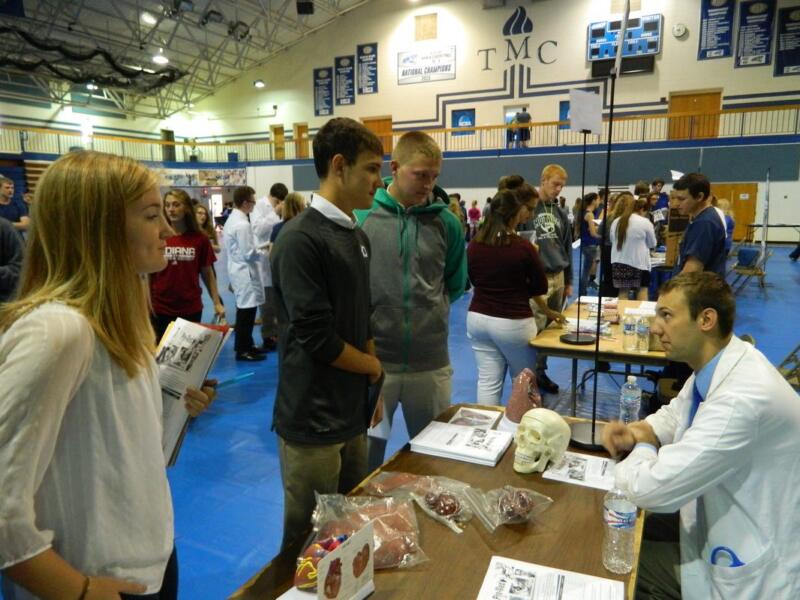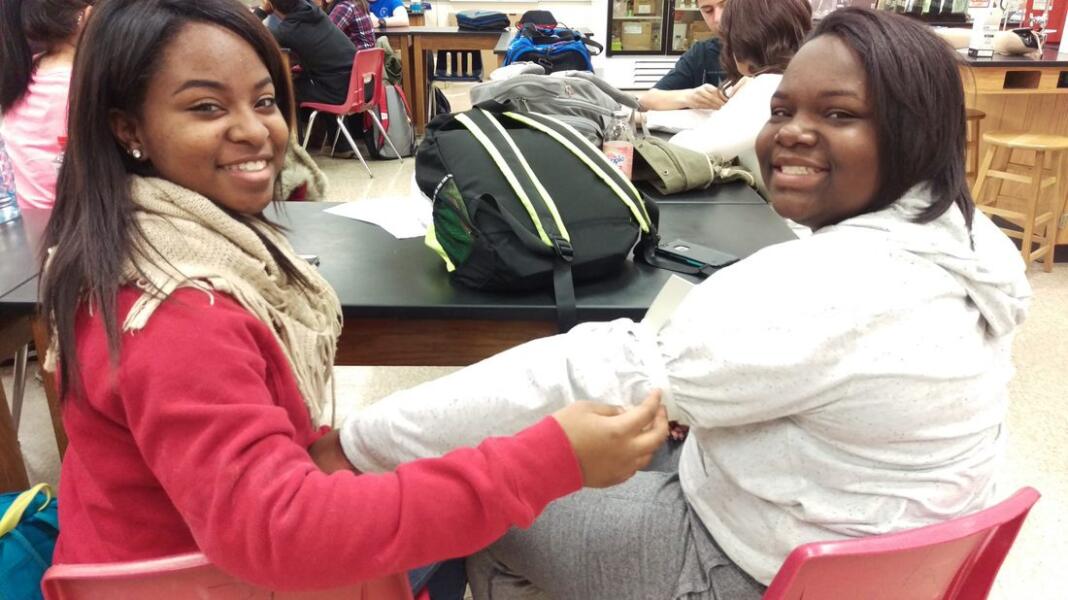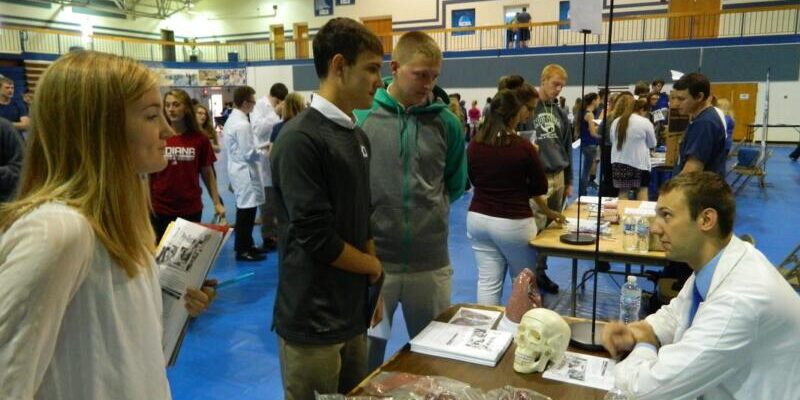Beth Warning, MS, MLS(ASCP)CM, ASCLS Region IV Director
 |
 |
| The Area Health Education Center (AHEC) organizes the Health Careers Showcase (top) and Health Career Explorer program (bottom) to recruit high school students into healthcare careers, including medical laboratory science. |
We are often asked to share our story of how we became a medical laboratory professional. For me, I made my decision as a junior in high school, while participating in a program called Health Career Explorers. Each month, a group of us visited a local hospital and spent time in a different department. While the details have blurred over the years, I remember leaving the lab session set on finding a college with a program in what was then medical technology. And, as they say, the rest is history.
Fast forward several years, when I was the supervisor of education and safety at a large medical system. I became the face of the lab, attending high school career fairs or speaking to individual classes about medical lab science. It was then that I noticed the same presenters attending the same career fairs and connected with the team from the North Central Kentucky Area Health Education Center (AHEC). Now, as a member of the advisory board for the same AHEC, we work together to not only promote health careers, but also team up to promote medical laboratory science (MLS).
In Kentucky, like many states, we have eight centers throughout the commonwealth. Per the AHEC website, the centers work with a common mission—to improve the health of communities by developing partnerships through educational support to health profession students and practitioners, promote community health education, and support and promote health profession career choices.
There are three target areas of the Kentucky NC AHEC. The first is to support training needs of future healthcare professionals by assisting medical, PT, PA, and pharmacy students with identifying preceptors for clinical placement or rotations and assisting with housing within the community, especially in rural and underserved areas. The second is to provide community education opportunities in rural and underserved areas. Some of these educational programs include tobacco cessation and prevention outreach, diabetes type 2 and cardiovascular disease prevention, as well as other community health education classes. And the third area, where we in the MLS profession can partner, is in recruitment of professionals for the workforce. Let me elaborate on promoting the MLS profession in partnership with Kentucky students and our regional AHEC.
Classroom Presentations
AHEC staff have developed free, 45- to 50-minute presentations that can be brought into the classroom ranging from an overview on health careers, to presentations on epidemiology, blood typing, karyotyping, and even autopsy. These are just a few of the lab-related offerings.
Embedded into the hands-on activities are discussions on aseptic technique, anatomy and physiology, and overall health and wellness. Something that is always a big hit with students is the Metiman Patient Simulator, a life-sized sim patient that travels along with the AHEC staff to demonstrate patient assessment and vital signs, again with a review of the circulatory and cardiovascular anatomy and physiology.
Health Career Explorers
I was excited to be in a clinical setting when the North Central AHEC started its Health Career Explorer program. I was able to invite this young group of high school students to tour our lab, perform simple manual tests, like UA dips with non-infectious samples, mocked-up strep screens, and microscopic observations. One year, there happened to be a formalinized brain in histology, and the pathologist shared this with the amazed students. Many students had never seen a unit of blood processed and ready for transfusion. Just simply walking through the lab dispelled the concept of a high school biology or chemistry setting.
The North Central AHEC continues to work closely with the same healthcare system and in the fall of 2018 had 64 students from 18 area high schools enrolled in the Explorer program. Interested students must apply to the program, which is open to sophomores, juniors, and seniors in the regional high schools. A minimal fee is charged, and education on HIPAA and bloodborne pathogens is provided.
The Explorers have now morphed into a case study-based interprofessional experience, involving more than just tours. They link test outcomes with diagnosis. A situational case “family” has the most unfortunate health issues, but the same “family” is revisited as the case unfolds in each of the various disciplines throughout the hospital. The health careers spotlighted include clinical lab, radiology, PT, OT, and other disciplines.
Another Explorer group was formed in a rural high school as a club and has an additional 25 students. AHEC staff members are present throughout, alongside the professional presenting the designated topic for the evening. During the clinical lab visit, informational flyers are distributed regarding the University of Cincinnati Medical Laboratory Science Bachelor of Science program.
A second group, Health Explorers II, invites past students to delve deeper into related health careers that may not be as visible in a hospital, such as paramedics, public health, or molecular biology.
Health Career Showcase
Another benefit of the partnership with the NC AHEC is involvement in the Health Career Showcase. Each fall, students throughout the northern Kentucky area have the opportunity to attend this career-type fair, where numerous healthcare representatives have tables to provide hands-on experiences and career information.
This event, drawing over 600 students from more than 20 high schools, is one of the most efficient and organized career events I have ever attended. Students are bused into the event on a rotating schedule and filter through the auditorium speaking with over 30 healthcare professionals, including medical lab science. Where else can we as lab professionals encounter such an inquisitive audience, in one place, for a few short hours?
Gateway to Health Careers Summer Camp
Each year, the North Central AHEC hosts a five-day summer camp filled with education and hands-on opportunities for 15 to 20 high school students, in partnership with a local medical center and community college. In the past, I have been invited to represent the field of medical lab science, providing a brief overview presentation along with mock urine dips or blood typing. While this may only be one hour out of my summer schedule, the opportunity is priceless.
The AHEC also publishes a Health Careers Resource Guide highlighting each healthcare discipline, education, average salary, state colleges and universities offering the major, and provides websites of interest (ASCLS of course!) for more information.
I encourage you to reach out to your state AHEC and develop a partnership for promoting the profession of medical laboratory science. The AHEC team has connections with teachers, guidance counselors, and schools, reaching students who may be unaware of the medical laboratory profession. They welcome the expertise of lab professionals to impart wisdom and knowledge to the students. The partnership that was established many years ago is truly a win-win for everyone involved.
Special thanks to the North Central AHEC staff Rose Mueller, Juliana McGuinn, and Vivian Lockstead.
Beth Warning is assistant professor in the medical laboratory science program at the University of Cincinnati-College of Allied Health Sciences.
For more information about Area Health Education Center (AHEC), visit www.nationalahec.org.
